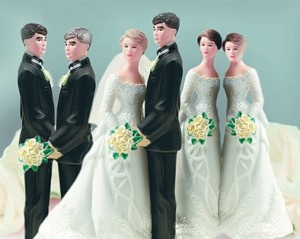1 When man began to multiply on the face of the land and daughters were born to them, 2 the sons of God saw that the daughters of man were attractive. And they took as their wives any they chose. 3 Then the Lord said,” My Spirit shall not abide in man forever, for he is flesh: his days shall be 120 years.”
Genesis 6:1-3 (ESV)
 Monogamy and marital stability are in crisis, and the gay lobby is capitalizing on this situation as it argues for “gay marriage.” They say that a change in law will encourage homosexuals to move from a lifestyle of dangerous promiscuity into the safety and decency of a covenanted relationship. But as the Bible shows, while the prospect of monogamous-marital devotion is extremely important, it is not enough to make a marriage valid.
Monogamy and marital stability are in crisis, and the gay lobby is capitalizing on this situation as it argues for “gay marriage.” They say that a change in law will encourage homosexuals to move from a lifestyle of dangerous promiscuity into the safety and decency of a covenanted relationship. But as the Bible shows, while the prospect of monogamous-marital devotion is extremely important, it is not enough to make a marriage valid.
From the wonders of Creation and Eden, through the Fall, to the Flood, Genesis traces humanity’s downward spiral, culminating in God’s judgment of drowning on everyone except Noah’s family. One offence, noted in Genesis 6:1-3, has prompted a range of interpretations. It is not entirely clear who the “sons of God” might be, but they had no business marrying the “daughters of man.” Some say these “sons of God” were angels. Others claim they were the offspring of Seth, who married the children of Cain. The crucial question for marriage is not what they were, but what they were not, namely acceptable spouses for the “daughters of man.”
The text offers no suggestion that the marriages were short-lived, contentious, or superficial. It is quite reasonable to suppose that at least some of these unions were lasting and peaceful, but that was not the point. They should never have been solemnized in the first place.
If the “sons of God” were angels, then the marriages were contrary to the order of Creation. Such unions would have been unnatural, as would homosexual marriages (cf. Romans 1:26-27). If “the sons of God” were Sethites, who chose their brides from the “pagan pool” of Cain’s progeny, then their matrimony would have been unholy. Either way, the Lord was disgusted with these unions, no matter how devoted the partners were to each other. He shortened their lives and began to withdraw His favor (v. 3).
Genesis 6:5 presents the grounds for God’s sending a worldwide destructive flood—that “the wickedness of man was great in the earth, and that every intention of the thoughts of his heart was only evil continually.” It is a very general statement of rampant evil, and it is quite significant that the only specific evil named in the beginning verses of this chapter concerned marriage. God could have mentioned robbery, murder, adultery, or any number of other grave offenses, and He did speak of corruption and violence in subsequent verses (vv.11-13), but He chose illicit wedlock as His lead example.
In other words, marriage is defiled not only by unfaithfulness; it can be impure per se, wrong from the very moment of its inception. No matter what promises certain couples might make to each other, or where they might make them, the relationships are, in and of themselves, profane and cannot be sanctified. Despite many claims to the contrary, there is clearly more to sexual ethics than the imperative to covenanted faithfulness in relationships.
The perceived benefits of widening the definition of marriage are far outweighed by the damage that would be caused by granting legitimacy to deviant behaviors. Marriage is a wonderful means of God’s blessing for whole societies, but the story of the Flood stands as a warning that, when perverted, it can also be the source of terrible curses. Such would be the case with homosexual “marriage” which is both unnatural and unholy.